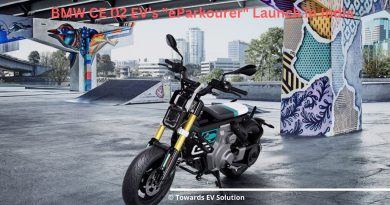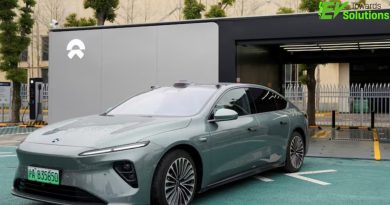Volkswagen Unveils New ID.4 Electric SUV in Global Market Expansion
Volkswagen has officially launched its highly anticipated ID.4 electric SUV, marking a significant step in its strategy to expand its electric vehicle (EV) offerings globally. Its sleek design, spacious interior, and advanced technology, the ID.4 aims to capture the growing demand for electric SUVs in both established and emerging markets.
Electric Vehicles Market Size
According to the Towards Automotive report on the global electric vehicle market size accounted for USD 255.54 billion in 2023 and is predicted to be worth around USD 2108.80 billion by 2033, growing at a solid CAGR of 2342% from 2024 to 2034.
VW Group has introduced the hotly anticipated ID.4 electric SUV, moving the automaker ahead in its plan to grow its electric vehicle battery business worldwide. The ID.4 is designed to become an appealing car for buyers, who are looking for an electric SUV as this segment is rapidly expanding in both traditional and new economy markets.
Key Features of the Volkswagen ID.4 Electric SUV
- Performance and Range: The ID.4 is powered by a 77 kWh battery, delivering an estimated range of 250 miles on a single charge. It features an electric motor that produces 201 horsepower, allowing for a 0-60 mph acceleration in just 7.5 seconds.
- Sustainability: Volkswagen emphasizes sustainability in its production processes, using recycled materials and aiming for a carbon-neutral lifecycle for the ID.4. The company is committed to reducing its carbon footprint in line with the Paris Agreement goals.
- Smart Technology: The ID.4 is equipped with Volkswagen’s ID. Cockpit, featuring a 10-inch touchscreen display, voice recognition, and connectivity features that enhance the driving experience.
Global Electric Vehicle Market Insights
The ID.4 is being launched at a time when the global market for electric vehicles is on an unprecedented upward trend. IEA has suggested that more than 30 million electric cars were on the road across the world in 2023 statutorily 50% than in the preceding year.
Global Electric Vehicle Stock Growth (2019–2023)
| Year | Electric Vehicles on the Road (Million Units) | Annual Growth Rate (%) |
| 2019 | 7.2 | — |
| 2020 | 10.2 | 42 |
| 2021 | 16.5 | 62 |
| 2022 | 20.5 | 24 |
| 2023 | 30.0 | 46 |
Volkswagen’s Electrification Strategy
Volkswagen is committed to becoming a leader in the electric vehicle market, planning to invest USD 85 billion in EV development over the next five years. The company aims to launch 70 new electric models by 2028, targeting an annual production capacity of 1.5 million electric vehicles.
- Global Reach: The ID.4 is a critical component of Volkswagen’s strategy to penetrate global markets, with a focus on regions such as North America, Europe, and China. The company anticipates that 30% of its total sales will come from electric vehicles by 2026.
- Charging Infrastructure: To support the growing EV market, Volkswagen is collaborating with Ionity and ChargePoint to expand its charging network, planning to install 18,000 charging points across Europe and North America by 2025.
Government Initiatives and Market Trends
Government initiatives worldwide are crucial in promoting electric vehicle adoption. In the European Union, the Green Deal aims to have at least 30 million electric vehicles on the road by 2030, backed by substantial investment in charging infrastructure.
Government EV Targets and Incentives (2024)
| Region | Target for Electric Vehicles by 2030 | Purchase Incentives (USD) | Charging Infrastructure Investment |
| European Union | 30 million | Up to $8,000 | €1 billion for charging points |
| United States | 50% of new vehicle sales | Up to $7,500 | $5 billion for charging infrastructure |
| China | 20% of total vehicle sales | Up to $9,000 | $2 billion for charging stations |
| United Kingdom | 13 million | Up to £3,000 | £1.5 billion for public charging |
The introduction of the ID.4 remains an important message about Volkswagen’s electrification strategy in light of the constantly changing car industry. They are sifting towards sustainable transport in the future, electric automobiles are becoming popular customers demand greener solutions to their transport problems. Analysis shows that by 2030, sales of electric vehicles could exceed 40% of total global vehicle sales, due to technological advancement, reduced battery costs, and increased consumer sensitivity to environmental concerns.
With a Master of Science in Statistics and over two years of expertise in the market research industry, Rushikesh brings a wealth of knowledge to the world of electric vehicle (EV) news. His passion for the automotive sector, combined with his statistical expertise, allows him to analyze trends, consumer behavior, and emerging technologies with precision. Rushikesh’s ability to dive deep into the numbers, yet communicate them in a reader-friendly manner, makes him a key voice in the fast-evolving EV industry.
Having spent his academic and professional career immersed in data-driven analysis, Rushikesh leverages his strong statistical foundation to offer insights that are both thorough and forward-thinking. His keen interest in the automotive industry, especially electric vehicles, positions him uniquely to understand not only the current landscape but also the trajectory of the sector as governments, manufacturers, and consumers increasingly lean towards sustainable transportation.



